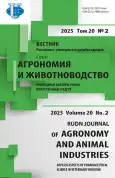The influence of climatic factors on sunflower ontogenesis in conditions of the Orenburg region
- Authors: Nazarova N.M.1, Fedorova D.G.1
-
Affiliations:
- Orenburg State University
- Issue: Vol 20, No 2 (2025): Applied aspects of pharmaceutical science in veterinary medicine
- Pages: 239-252
- Section: Crop production
- URL: https://journal-vniispk.ru/2312-797X/article/view/315845
- DOI: https://doi.org/10.22363/2312-797X-2025-20-2-239-252
- EDN: https://elibrary.ru/NPVHAA
- ID: 315845
Cite item
Full Text
Abstract
The effect of the variability of certain climatic parameters during the growing season on the cultivation of sunflower (Helianthus annuus L.) in the Orenburg region was studied. It was shown that the growth and development of Helianthus annuus L. are significantly influenced by both humidity and temperature, but the amount of these parameters changes over time due to the ongoing climate change. In this regard, one of the principles of agronomy is to identify relationships between the phases of phenological development in the context of changing weather conditions. It allows to assess the measures aimed at adapting sunflower to a specific cultivation zone. Timely implementation of these measures will enable us to manage the susceptibility of the agricultural sector and predict crop yields. The present study is based on registration of eight phenological phases from sowing to harvesting for three years and assessment of the influence of weather factors of a particular season on both ontogenesis of the crop in general and duration of each phenological phase in particular. According to the results of observations, it was found that the duration of Helianthus annuus L. cv. ‘Poseidon 625’ vegetation in climatic conditions of Orenburg region was on average 99 days and is determined by the timing from the formation of the first and second pairs of true leaves to seed formation. The phenological periods requiring maximum moisture were determined — from sowing to germination and from flowering to seed filling (r = 0.9, the significance level is 90%). The data obtained during the study can be used by farmers and agronomists to determine the optimal timing of sowing oilseeds not only in Orenburg region, but also in each specific region engaged in their production.
Keywords
About the authors
Natalia M. Nazarova
Orenburg State University
Author for correspondence.
Email: nazarova-1989@yandex.ru
ORCID iD: 0000-0002-7449-0378
SPIN-code: 1242-9420
Head of the scientific group of the Botanical Garden, Senior Researcher, Research Center ”Biological Systems and Nanotechnology“
13 Pobedy ave., Orenburg, Orenburg region, 460018, Russian FederationDaria G. Fedorova
Orenburg State University
Email: daryaorlova24@rambler.ru
ORCID iD: 0000-0002-5323-4965
SPIN-code: 6805-9269
Director of the Botanical Garden, Senior Researcher, Research Center ”Biological Systems and Nanotechnology“
13 Pobedy ave., Orenburg, Orenburg region, 460018, Russian FederationReferences
- Abberton M, Batley J, Bentley A, Bryant J, Cai H, Cockram J, et al. Global agricultural intensification during climate change: a role for genomics. Plant Biotechnol Journal. 2016;14(4):1095–1098. doi: 10.1111/pbi.12467
- Langridge P, Braun H, Hulke B, Ober E, Prasanna BM. Breeding crops for climate resilience. Theoretical and applied genetics. 2021;134(6):1607–1611. doi: 10.1007/s00122‑021‑03854‑7 EDN: OCGUKS
- Ganeva D, Tallec T, Brut A, Prikaziuk E, Tomelleri E, Koren G, et al. In-situ start and end of growing season dates of major European crop types from France and Bulgaria at a field level. Data in Brief. 2023;51:109623. doi: 10.1016/j.dib.2023.109623 EDN: YUFBAE
- Radonic LM, Lewi DM, López NE, Hopp HE, Escandón AS, Bilbao ML. Sunflower (Helianthus annuus L.). In: Wang K. (ed.) Agrobacterium Protocols. Methods in Molecular Biology. New York: Springer; 2015. p.47–55. doi: 10.1007/978‑1‑4939‑1658‑0_5
- Lewi DM, Hopp HE, Escandón AS. Sunflower (Helianthus annuus L.). In: Methods in molecular biology. 2006. p. 291–298. doi: 10.1385/1-59745-130-4:291
- Beteri J, Lyimo JG, Msinde JV. The influence of climatic and environmental variables on sunflower planting season suitability in Tanzania. Scientific reports. 2024;14(1):3906. doi: 10.1038/s41598‑023‑49581‑5 EDN: ISINHL
- Qin L, Jin Y, Duan P, He H. Field-based experimental water footprint study of sunflower growth in a semi-arid region of China. Journal of the science of food and agriculture. 2016;96(9):3266–3273. doi: 10.1002/jsfa.7726
- Abdallah MMS, Bakry BA, El-Bassiouny HMS, El-Monem AAA. Growth, yield and biochemical impact of anti-transpirants on sunflower plant grown under water deficit. Pakistan journal of biological sciences. 2020;23(4):454–466. doi: 10.3923/pjbs.2020.454.466 EDN: FQHLXG
- Awais M, Wajid A, Saleem MF, Nasim W, Ahmad A, Raza MAS, et al. Potential impacts of climate change and adaptation strategies for sunflower in Pakistan. Environmental science and pollution research international. 2018;25(14):13719–13730. doi: 10.1007/s11356‑018‑1587‑0 EDN: BXAFKG
- Huang C, Li N, Zhang Z, Liu Y, Chen X, Wang F, et al. What is the consensus from multiple conclusions of future crop yield changes affected by climate change in China? International journal of environmental research and public health. 2020;17(24):9241. doi: 10.3390/ijerph17249241 EDN: ZXDYSA
- Jocković M, Jocić S, Cvejić S, Marjanović-Jeromela A, Jocković J, Radanović A, et al. Genetic improvement in sunflower breeding-integrated omics approach. Plants. 2021;10(6):1150. doi: 10.3390/plants10061150 EDN: WCQDIO
- Koshulko AP. Plant crops of Orenburg region as the basic sphere of the region’s economy. Bulletin of the Academy of Knowledge. 2020;(1):109–111. (In Russ.). doi: 10.24411/2304‑6139‑2020‑00019 EDN: XFULLY
- Chubanova YV, Kostin VV, Andreeva NV, Bobrovich LV. Sunflower vegetation periods depending on environmental conditions. The Education and Science Journal. 2020;3(4):240. (In Russ.). EDN: OTONZM
- Tkhakushinova LN, Mamsirov NI, Kozyrev AH. Influence of plant density on productivity and quality indicators of sunflower oilseeds. New technologies. 2023;19(1):120–129. (In Russ.). doi: 10.47370/ 2072‑0920‑2023‑19‑1‑120‑129 EDN: JAWQZF
- Gonova OV, Malygin AA. Formation of an agroeconomic mechanism for minimizing the risks of potato production based on the introduction of modern knowledge intensive technologies. Modern high technologies. Regional application. 2020;(1):27–35. (In Russ.). doi: 10.23649/jae.2021.1.17.6 EDN: UILELC
Supplementary files










